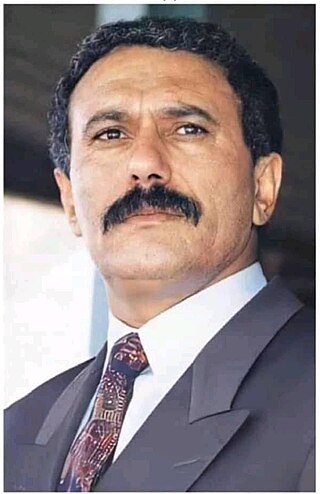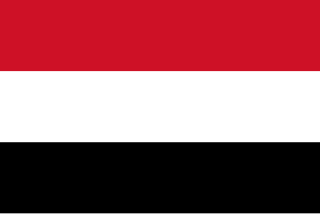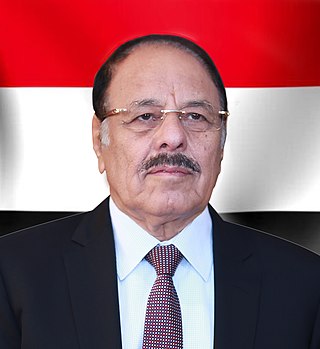
The history of Yemen describes the cultures, events, and peoples of what is one of the oldest centers of civilization in the Near East. Its relatively fertile land and adequate rainfall in a moister climate helped sustain a stable population, a feature recognized by the ancient Greek geographer Ptolemy, who described Yemen as Eudaimon Arabia meaning "fortunate Arabia" or "Happy Arabia". Yemenis had developed the South Arabian alphabet by the 12th to 8th centuries BC, which explains why most historians date all of the ancient Yemeni kingdoms to that era.

The Yemeni Armed Forces are the military forces of the Republic of Yemen. They include the Yemeni Army, Yemeni Navy and the Yemeni Air Force. The capital of the country, Sana’a is where the military is headquartered. Per the constitution of Yemen, the President of Yemen serves as the commander-in-chief.

Ali Abdullah Saleh al-Ahmar was a Yemeni politician who served as the first President of the Republic of Yemen, from Yemeni unification on 22 May 1990, to his resignation on 27 February 2012, following the Yemeni Revolution. Previously, he had served as President of the Yemen Arab Republic, or North Yemen, from July 1978, to 22 May 1990, after the assassination of President Ahmad al-Ghashmi.

Yemen, officially the Republic of Yemen, is a sovereign state in West Asia. Located in the southern Arabian Peninsula, it borders Saudi Arabia to the north, Oman to the northeast, and the Indian Ocean to the south, sharing maritime borders with Eritrea, Djibouti and Somalia across the Horn of Africa. Covering roughly 528,000 square kilometres, with a coastline of approximately 2,000 kilometres, Yemen is the second largest country on the Arabian Peninsula. Sanaa is its constitutional capital and largest city. Yemen's estimated population is 34.7 million, comprised mostly of Arab Muslims. It is a member of the Arab League, the United Nations, the Non-Aligned Movement and the Organisation of Islamic Cooperation.
Ahmed Ali Abdullah Saleh al-Ahmar is the eldest son of former Yemeni president Ali Abdullah Saleh, and was a commander of approximately 80,000 troops of the Republican Guard unit of the Yemeni Army. On April 14, 2015, the United States Department of the Treasury's Office of Foreign Assets Control added Saleh to the list of Specially Designated Nationals, barring US citizens and businesses from interacting with Saleh or his assets.

Abdrabbuh Mansur Hadi is a Yemeni politician and former field marshal of the Yemeni Armed Forces who served as the president of Yemen from 2012 until 2022, when he stepped down and transferred executive authority to the Presidential Leadership Council, with Rashad al-Alimi as its chairman. He was the vice president to Ali Abdullah Saleh from 1994 to 2012.

The Yemeni revolution followed the initial stages of the Tunisian Revolution and occurred simultaneously with the 2011 Egyptian revolution and other Arab Spring protests in the Middle East and North Africa. In its early phase, protests in Yemen were initially against unemployment, economic conditions and corruption, as well as against the government's proposals to modify Yemen's constitution. The protesters' demands then escalated to calls for the resignation of Yemeni President Ali Abdullah Saleh. Mass defections from the military, as well as from Saleh's government, effectively rendered much of the country outside of the government's control, and protesters vowed to defy its authority.

Ali Mohsen Saleh al-Ahmar, sometimes spelled Muhsin, is a Yemeni military officer who served as the vice president of Yemen from 2016 to 2022, when he was dismissed by President Abdrabbuh Mansur Hadi, who transferred the powers of the president and vice president to the Presidential Leadership Council. He is a general in the Yemeni Army and was the commander of the northwestern military district and the 1st Armoured Division. He played a leading role in the creation of the General People's Congress.

Abdul-Malik Badruldeen al-Houthi, also known as Abu Jibril, is a Yemeni politician and religious leader who serves as the leader of the Houthi movement, a revolutionary movement principally made up of Zaidi Muslims. His brothers Yahia and Abdul-Karim are also leaders of the group, as were his late brothers Hussein, Ibrahim, and Abdulkhaliq. Abdul-Malik al-Houthi is the leading figure in the Yemeni Civil War which started with the Houthi takeover in Yemen in the Saada Governorate in northern Yemen.

The following is a timeline of the 2011–2012 Yemeni revolution from 3 June through 22 September 2011. The Yemeni revolution was a series of major protests, political tensions, and armed clashes taking place in Yemen, which began in January 2011 and were influenced by concurrent protests in the region. Hundreds of protesters, members of armed groups, army soldiers and security personnel were killed, and many more injured, in the largest protests to take place in the South Arabian country for decades.

The following is a timeline of the 2011–2012 Yemeni revolution from 23 September through December 2011. The Yemeni revolution was a series of major protests, political tensions, and armed clashes taking place in Yemen, which began in January 2011 and were influenced by concurrent protests in the region. Hundreds of protesters, members of armed groups, army soldiers and security personnel were killed, and many more injured, in the largest protests to take place in the South Arabian country for decades.

The following is a timeline of the 2011–2012 Yemeni revolution from January to 27 February 2012. The Yemeni revolution was a series of major protests, political tensions, and armed clashes taking place in Yemen, which began in January 2011 and were influenced by concurrent protests in the region. Hundreds of protesters, members of armed groups, army soldiers and security personnel were killed, and many more injured, in the largest protests to take place in the South Arabian country for decades.
On 21 May 2012, a suicide attack was launched against Yemeni Army soldiers practicing for the annual Unity Day military parade in Sanaa, Yemen. The ceremony is carried out every year on 22 May since 1990 to mark the unification of North Yemen and South Yemen as the Republic of Yemen. Responsibility for the attack was claimed by the Al Qaeda in the Arabian Peninsula (AQAP) affiliate Ansar al-Sharia.

Hisham Sharaf Abdullah is a Yemeni civil engineer and politician who has served in several cabinet posts. He is currently Yemen's minister of foreign affairs, and formerly the minister of higher education and scientific research.

The Special Security Forces, formerly known until 2013 as the Central Security Organization, is a paramilitary force in Yemen under the control of the Minister of the Interior and forms a key part of the Yemeni security establishment. The force was some 50,000 strong as of 2008, before the Yemeni crisis began, and SSF units are equipped with a range of infantry weapons and armored personnel carriers. The force also has its own extrajudicial detention facilities.

The Houthi takeover in Yemen, also known as the September 21 Revolution, or 2014–15 coup d'état, was a popular revolution against Yemeni President Abdrabbuh Mansur Hadi led by the Houthis and their supporters that pushed the Yemeni government from power. It had origins in Houthi-led protests that began the previous month, and escalated when the Houthis stormed the Yemeni capital Sanaa on 21 September 2014, causing the resignation of Prime Minister Mohammed Basindawa, and later the resignation of President Abdrabbuh Mansur Hadi and his ministers on 22 January 2015 after Houthi forces seized the presidential palace, residence, and key military installations, and the formation of a ruling council by Houthi militants on 6 February 2015.

The Yemeni crisis began with the 2011–2012 revolution against President Abdullah Saleh, who had led Yemen for 33 years. After Saleh left office in early 2012 as part of a mediated agreement between the Yemeni government and opposition groups, the government led by Saleh's former vice president, Abdrabbuh Mansur Hadi, struggled to unite the fractious political landscape of the country and fend off threats both from Al-Qaeda in the Arabian Peninsula and from Houthi militants that had been waging a protracted insurgency in the north for years.
The Battle of Aden International Airport broke out in the early morning hours of 19 March 2015, when Yemen Army units loyal to former president Ali Abdullah Saleh attacked the airport in Aden, Yemen. The airport was defended by soldiers and guards supporting Abdrabbuh Mansur Hadi, Yemen's internationally recognised president.

Abdul-Hafez al-Saqqaf is a Yemeni military officer. A general in Yemen's Special Security Forces, al-Saqqaf achieved notoriety when he defied President Abd Rabbuh Mansur Hadi's decree to step down in March 2015, amid the aftermath of a coup d'état that split Yemen's government and military and saw Hadi establish a provisional seat of government in Aden.

Tareq Mohammed Abdullah Saleh is a Yemeni military commander and the nephew of the late President Ali Abdullah Saleh. He is currently a member of the presidential council of Yemen. His father was Major General Mohammed Abdullah Saleh. Prior to the national crisis beginning in 2011, he headed the elite Presidential Guard. In 2012, he was ordered to stand down from this position. On 10 April 2013, he was appointed as a military attaché to Germany in an effort to remove the remnants of the previous regime. He re-emerged as a commander in the Houthi-Saleh alliance when the Yemeni Civil War broke out in 2015. When this alliance collapsed in 2017, Tareq Saleh commanded troops loyal to his uncle. Prior to the collapse of the pro-Saleh forces, the Saudi-owned Al Arabiya reported that negotiations were ongoing to form a military council in Saleh-held areas, which would have been headed by Tareq.













